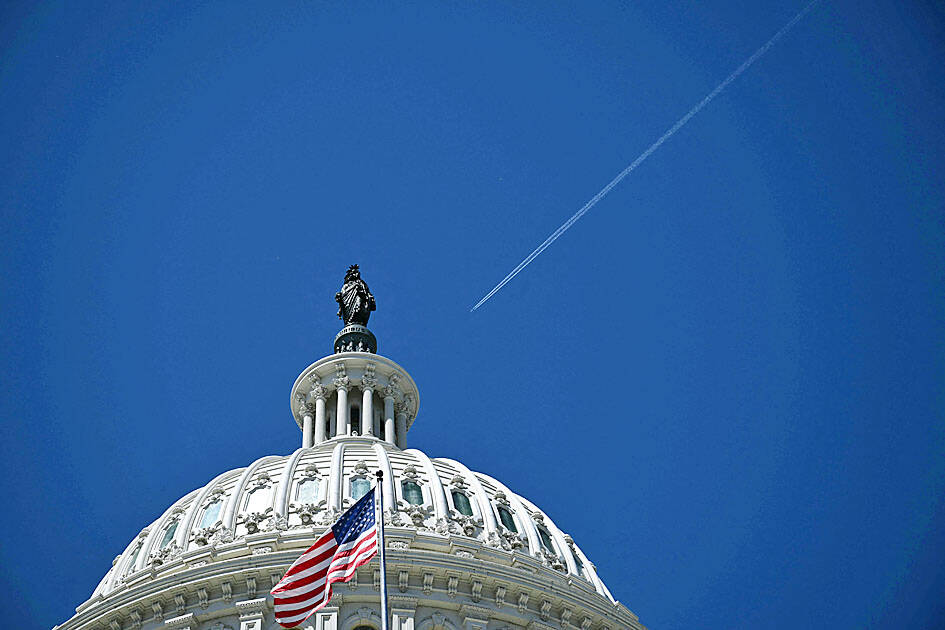Two US senators have introduced legislation to streamline arms sales to Taiwan by adopting similar rules as those used for “NATO Plus” countries.
The providing our regional companions upgraded protections in nefarious environments act, or PORCUPINE Act, was introduced on Tuesday by US senators Pete Ricketts and Chris Coons, according to a statement issued by Ricketts on Tuesday.
The bill would put Taiwan into the NATO Plus category — a group that includes Japan, Australia, South Korea, New Zealand and Israel — for shorter formal congressional notification times and higher weapons value thresholds.

Photo: AFP
Under the US’ Arms Export Control Act (AECA), the US Department of State is required to informally notify the US Congress of a prospective arms sale, thus allowing Congress to raise any questions or concerns.
After the informal process is complete, the AECA requires the US president to formally notify Congress 30 days before approving the sale, enhancement or upgrading of “major defense equipment” valued at US$14 million or more.
The notification requirement also extends to “defense articles and services” valued at US$50 million or more, and “design and construction services” valued at US$200 million or more.
For NATO and NATO Plus states — and Taiwan if the proposed bill passes — the president’s notification period is shortened to 15 days, while the dollar thresholds are raised to US$25 million, US$100 million and US$300 million respectively.
The proposed legislation would also require the US secretary of state to establish an expedited decisionmaking process for transfers of defense articles or services from NATO or NATO Plus countries to Taiwan.
“On my recent [visit] to Taiwan, I saw a partner ready and willing to provide for its own self-defense in the face of increasing aggression by communist China,” Ricketts was quoted as saying in the statement. “However, our antiquated arms sales process and struggling defense industrial base have prevented Taiwan from getting the weapons it needs in a timely manner.”
“The PORCUPINE Act will make it easier for us to send arms to Taiwan, quicker, while also creating a process for our closest allies and partners to do the same,” he said.
Ricketts, Coons and US Senator Ted Budd visited Taiwan from April 16 to 19 to hold talks on regional security, trade and investment with President William Lai (賴清德) and other top government officials.

The Taiwanese passport ranked 33rd in a global listing of passports by convenience this month, rising three places from last month’s ranking, but matching its position in January last year. The Henley Passport Index, an international ranking of passports by the number of designations its holder can travel to without a visa, showed that the Taiwan passport enables holders to travel to 139 countries and territories without a visa. Singapore’s passport was ranked the most powerful with visa-free access to 192 destinations out of 227, according to the index published on Tuesday by UK-based migration investment consultancy firm Henley and Partners. Japan’s and

NATIONAL SECURITY THREAT: An official said that Guan Guan’s comments had gone beyond the threshold of free speech, as she advocated for the destruction of the ROC China-born media influencer Guan Guan’s (關關) residency permit has been revoked for repeatedly posting pro-China content that threatens national security, the National Immigration Agency said yesterday. Guan Guan has said many controversial things in her videos posted to Douyin (抖音), including “the red flag will soon be painted all over Taiwan” and “Taiwan is an inseparable part of China,” while expressing hope for expedited “reunification.” The agency received multiple reports alleging that Guan Guan had advocated for armed reunification last year. After investigating, the agency last month issued a notice requiring her to appear and account for her actions. Guan Guan appeared as required,

Japan and the Philippines yesterday signed a defense pact that would allow the tax-free provision of ammunition, fuel, food and other necessities when their forces stage joint training to boost deterrence against China’s growing aggression in the region and to bolster their preparation for natural disasters. Japan has faced increasing political, trade and security tensions with China, which was angered by Japanese Prime Minister Sanae Takaichi’s remark that a Chinese attack on Taiwan would be a survival-threatening situation for Japan, triggering a military response. Japan and the Philippines have also had separate territorial conflicts with Beijing in the East and South China

A strong cold air mass is expected to arrive tonight, bringing a change in weather and a drop in temperature, the Central Weather Administration (CWA) said. The coldest time would be early on Thursday morning, with temperatures in some areas dipping as low as 8°C, it said. Daytime highs yesterday were 22°C to 24°C in northern and eastern Taiwan, and about 25°C to 28°C in the central and southern regions, it said. However, nighttime lows would dip to about 15°C to 16°C in central and northern Taiwan as well as the northeast, and 17°C to 19°C elsewhere, it said. Tropical Storm Nokaen, currently